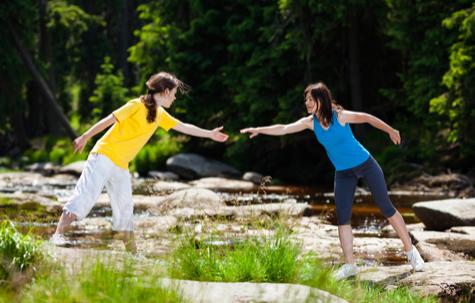It seems that every few months a new study emerges telling us that more and more of Australia’s children and teenagers are becoming depressed or something tragic occurs like the loss of Robin Williams that reminds us that we should check in on our family members a little more often.
As parents, there are times where we wonder if something is just an adolescent attitude shift or a change that requires the assistance of some kind of professional. This line is often blurred and leaves us wondering if we are doing the right thing by our kids. In knowing some of the signs and symptoms we may better know when its time to get help from another person.
A lot of times when I work with families and schools, we try to acknowledge what a child is really saying to us.
If we focus exclusively on what we can actually see from our child (behaviours like skipping school, being more irritable and changes in self-esteem etc), we may think there is an easy 'fix' just waiting to be unlocked. This can be the case but sometimes it is what we refer to as the "tip of the iceberg".
The part of the iceberg that floats above the surface - the part we can see - is only a fraction of what lies beneath. This is the same with behaviours.
If we called the tip of the iceberg Behaviours or Actions then the underneath would be called Thoughts, Feelings and Beliefs. These take a lot more work to change than the top. After all, we can force someone to attend school but will it affect their feelings towards themselves?
It’s in what we cannot see that may be affecting our child the most.
The hard work in parenting resilient children is in viewing our child as their own unique individual. This is challenging when they have grown up in our house, under our supervision, with our support. However, in their teenage years they are starting to think about life away from their parents and are in search of their own values.
As a therapist working with teenagers, I try to help locate what is beneath the surface and help students to define it.
This is why we run outdoor programs with students struggling with depression. We start by getting into a new environment that is exciting but causes us to adapt. We build an incredible trusting relationship and work on building insight into how our thoughts and feelings affect our behavioural output.
Students begin to see that when they are aware of their thoughts and feelings that they perform at their best. This is what the iceberg metaphor is all about. We don’t expect our kids to conform to a certain set of rules, values or principles but uncover the virtues that are inside of them already. In accepting these new values, teenagers begin to act in ways that coincide with these beliefs.
In our upcoming expedition with adolescent girls, we will be working to help understand these values.
On our trips with True North Expeditions, we work to be proud of our values and love those parts of ourselves.
By learning to understand our children’s values and beliefs, we inch closer towards helping them find their own path and their own true north. Self-esteem and confidence come when we can know and cherish what’s below the surface.
* * *
If you or someone you know needs help urgently, try Kids Helpline on 1800 55 1800 or Lifeline on 13 11 14.
If anyone is working through a difficult time and would like to talk about their situation, do not hesitate to contact me at will@truenorthexpeditions.com.au. I may be able to help connect you with the best person in your area or discuss any programs and services available for your son or daughter.



















__small.png)










